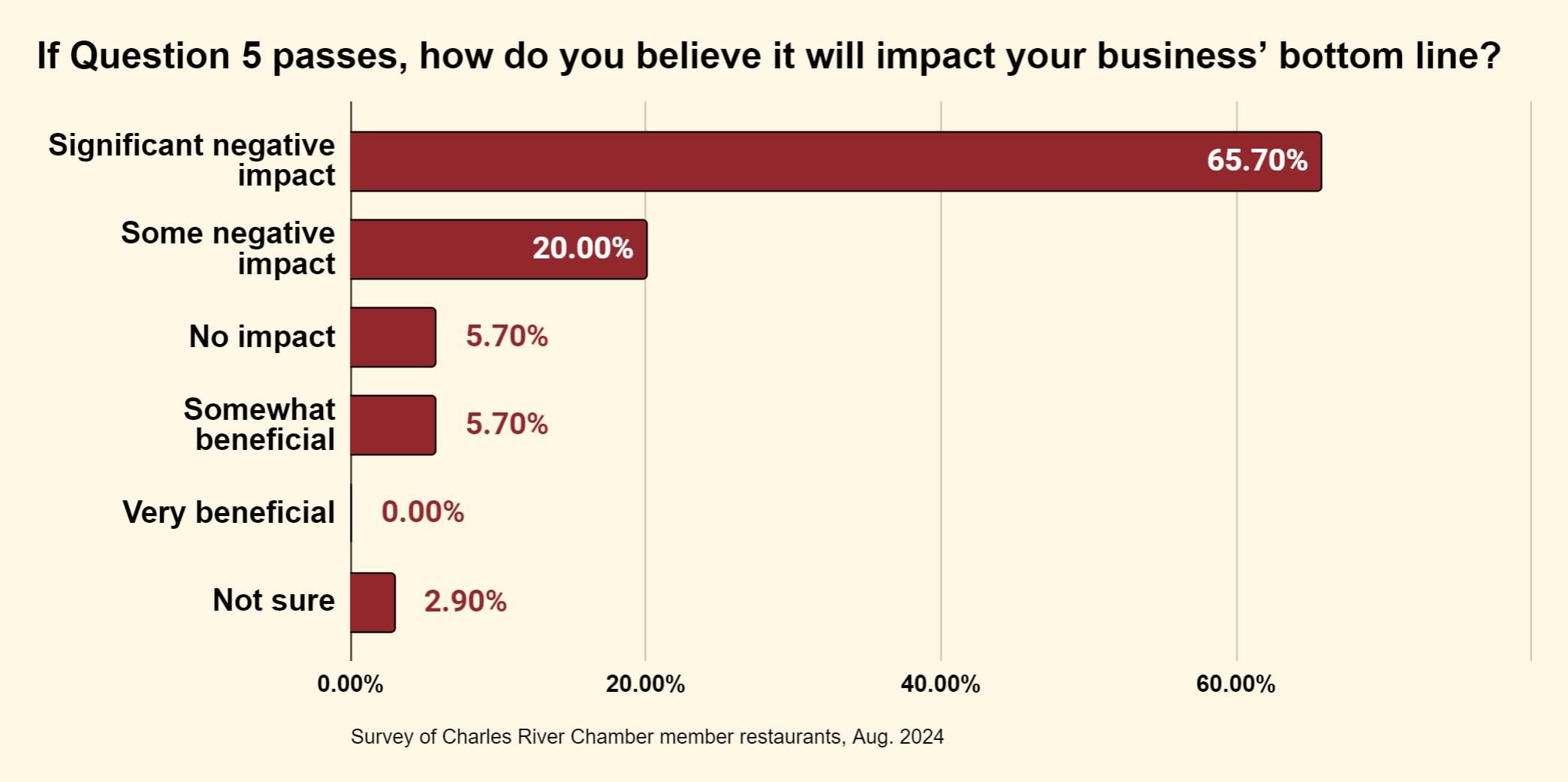Our view on Question 5

Our view on Question 5
Good morning friends,
Restaurants occupy a unique place in our business ecosystem.
They are the heart and soul of our downtowns, our village centers, and our communities.
They’re a factor when people decide where to live and when companies decide where to locate.
They generate foot traffic and economic vitality which bolsters retailers and other businesses. They provide first jobs for our teenagers and careers and livelihoods for many others, including farmers, bakers, and other suppliers.
Finally, our restaurants generate meal and property taxes that underwrite the municipal services and schools we depend upon.
So when the owners our independent restaurants tell us they’re worried that Question 5 (the ballot referendum that would eliminate the tipped minimum wage) could result in business closures and layoffs, we worry not just about these cherished businesses, but about other economic repercussions too.
Ultimately that’s why the Charles River Regional Chamber’s Board of Directors recommends a “no” vote on Ballot Question 5.
This morning we’ll explain why.
How it works now and what would change
Under current state law, wait staff, bartenders, manicurists and others who rely heavily on tips can be paid as little as $6.75 per hour, instead of the current $15.00 an hour, provided that tips make up the difference. If they don’t (for example, if it’s a slow night due to a snowstorm), employers must make up the difference and pay workers the full minimum wage.
Ballot Question 5, would gradually eliminate the tipped wage over five years. By 2029 all workers would earn the current minimum wage, which many observers predict will be closer to $20 by then.
Tips would be extra. But for the first time, restaurants would also be allowed to pool and share those tips with cooks, bookkeepers, and other back-of-the-house workers who aren’t allowed, by law, to a share of those tips.
If Question 5 passes, Massachusetts, would be one of just seven states without a tipped wage.
What our restaurant owners tell us
We surveyed 40 independent chamber member restaurant owners and operators in our four communities last month.
The overwhelming majority (86%) told us eliminating the tipped wage would have either a significant negative or somewhat negative impact on their bottom line.

Many restauranteurs I’ve spoken with say the proposed change comes at a time when their industry, which has always operated on thin margins, is still rebounding from the pandemic, coping with inflation and high credit card fees, wresting with soaring energy and insurance costs, and adapting to changes in dining habits in a work-from-home economy.
They also note that most back-of-the-house workers already earn more than minimum wage. Most wait staff take home far more than $15 an hour.
Many also worry that a significant number of customers will leave smaller tips, order less, or visit less frequently if Question 5 prevails to compensate for higher menu prices and/or service fees.
There’s also the actual elephant in the room. Some are anxious that one outcome of the presidential election could result in a mass deportation or loss of immigrant workers who are the backbone of their industry -- making this an already stressful and inopportune moment to consider changing business models.
What one independent study says
And then there’s this analysis from the independent Center for State Policy Analysis at Tufts University which found validity in the financial concerns shared by many in the hospitality sector.
The Tufts’ study concluded that requiring restaurants to cover the full cost of the minimum wage is likely to increase menu prices; push some restaurants out of business, or towards more limited service (i.e. QR code ordering or self-service).
It “could also favor chains over local establishments, as shrinking profit margins make it harder to earn a living with just one or a few locations.”
The same study also concluded that income among tipped workers is “likely to rise slightly” but noted that not all tipped workers support Question 5, adding “many tipped workers are drawn to their jobs by the desire to hustle for outsize tips.”
The authors also noted that “relying on tips sometimes leads to unreasonable demands or outright harassment from customers. If Question 5 passes, workers would have more freedom to push back.”
How the chamber reached its conclusion
In addition to reviewing the results of our survey, the chamber’s Board of Directors discussed this issue over two meetings.
We listened to two restaurant owners: one who opposed eliminating the tipped wage and one who supported it. The latter acknowledged this change would be hard for many yet represented needed reform for her profession. She said it was a matter of fairness to back-of-the-house staff, and created an opportunity for customers to share their appreciation for a great meal with those who prepared it.
Our directors took those last points seriously.
They acknowledged that reform is needed. In particular, businesses — not the state — should decide if they want to share tips with back-of-the-house employees. And we acknowledge that some bad operators fail to make up the difference during slow shifts and otherwise take advantage of workers.
Ultimately, we concluded that fears about businesses closing or layoffs are well-founded. Eliminating the tipped wage at this time would cause measurable harm to too many of our independent restaurants and to the downtowns, villages and communities these businesses serve.
We urge a no vote on Question 5.
And that’s what you need to know for today.
Hope to see you this Sunday at the Needham Harvest Fair. It’s going to be our largest ever.
I value your feedback
President & CEO
Charles River Regional Chamber
617.244.1688
